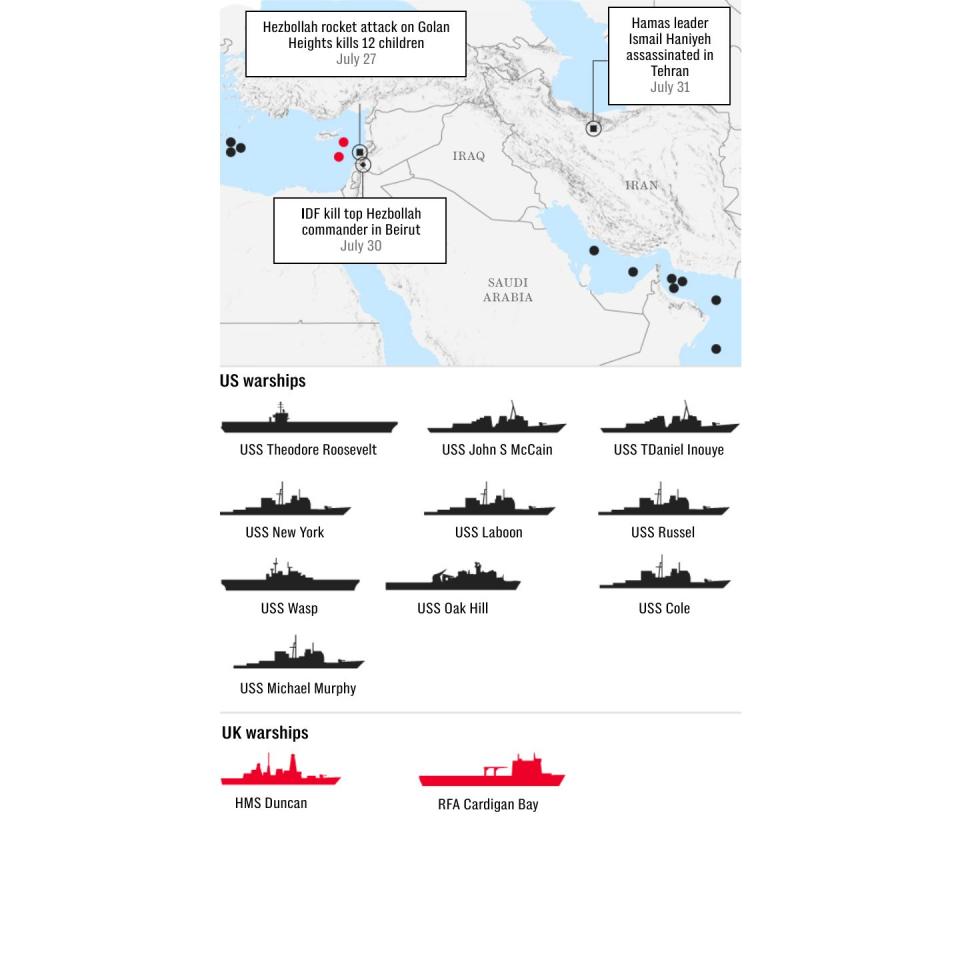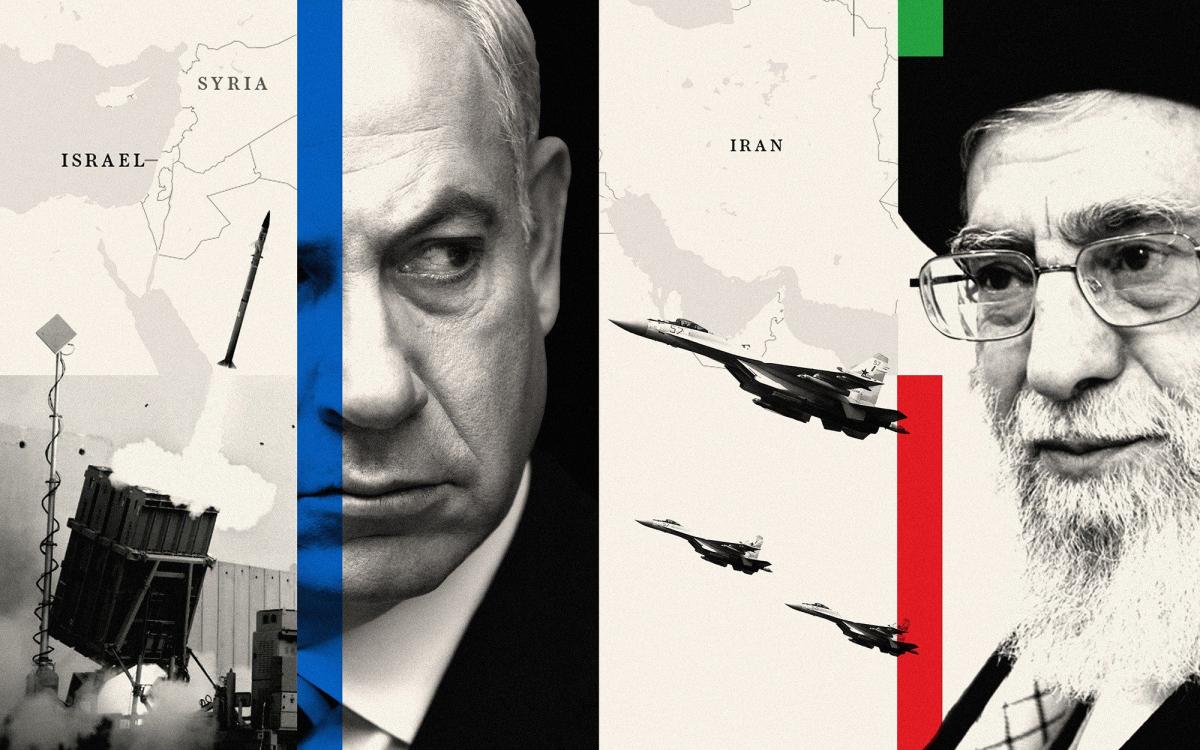Israel is bracing for a major assault by Iran, with tensions rising to levels not seen since the October 7 Hamas attacks
The US has sent fighter jets and warships to the Middle East while Britain has said Royal Navy ships and RAF helicopters are on standby.
Antony Blinken, the US secretary of state, told his G7 counterparts on Sunday that an attack by Iran and Hezbollah on Israel could start as early as Monday.
Media predictions about the timing continue to cause stress for Israelis, with forecasts ranging from “imminent” to “in the coming days”.
The expected assault would be a response to the killings in Tehran on Wednesday of Ismail Haniyeh, the visiting Hamas leader, and in Beirut last week of Fuad Shukr, a commander in Iran-backed group Hezbollah.
Hossein Salami, leader of the Iranian Revolutionary Guards (IRGC), said on Monday that Israel was “digging its own grave”.
“They will see the result of their mistake. They will see when, how and where they will get their response,” he said.
How will Iran respond?
Missile and drone attacks
With an estimated 3,000 ballistic missiles at its disposal, Iran has the potential to inflict serious damage. In April, it launched drones, cruise missiles and 120 ballistic missiles at Israel. Hezbollah – and Houthi rebels in Yemen – added to the barrage.
Some 99 per cent were shot down and failed to hit any large city. But the damage caused by just one ballistic missile in a civilian area would be enormous.
Iran’s highly advanced drones can reach Israel. Some can launch precision-guided bombs, while others, such as the Shahed-136 “kamikaze” drone, carry 20-40kg (44-88lbs) of explosives.
Cyber attacks
Israel is also expecting cyber attacks against vital infrastructure. In 2020, Iranian hackers attempted to increase chlorine levels in Israel’s water systems, according to the Financial Times.
There have been hundreds of Iran-linked cyber attacks in recent years on Israeli targets including Ben-Gurion airport, government websites, power plants, ports, oil refineries and energy firms.
If Iran launches a successful cyber attack, it should expect a similar response from Israel.
Embassies
Israelis, Jews and embassies abroad are considered a target as well. Israel has foiled a number of attacks in Europe and South America over the years and its embassies have been on high alert since Oct 7.
In January, police removed a “dangerous object” from the embassy in Sweden, leading the Swedish prime minister to condemn “an attempted attack”.

If Iran targets an embassy, and if an ambassador or official is killed, Israel might retaliate by attacking one of Iran’s embassies in the region, taking out valuable commanders.
Hezbollah
The Lebanon-based group has fired nearly 7,000 anti-tank missiles, rockets and drones at northern Israel since Oct 7, killing 40 people. After the killing of Shukr, it is now threatening to escalate its attacks.
Hezbollah has an estimated 150,000 rockets at its disposal of which 4,500 could reach central Israel. The most advanced missiles are precision-guided, and pose a significant threat.
While Israel’s air defence system has proven highly efficient, experts say that a full-scale attack by Hezbollah targeting sensitive sites in Israel would cause massive destruction and casualties.

Hezbollah has released several propaganda videos since Oct 7 with satellite footage of sensitive Israeli sites including army bases, the Dimona nuclear reactor and the airport.
In June, Hezbollah leader Hassan Nasrallah said that no place in Israel would be safe and that the group wouldn’t be guided by any rules in case of full-scale war. Israel fears that oil refineries, gas rigs, hospitals, power plants and civilian areas would be attacked by the GPS-guided missiles.
Hezbollah also has a vast arsenal of drones, which it regularly uses to attack Israel, inflicting casualties. Should Hezbollah decide to attack central Israel and civilian sites, it would probably trigger a full-scale war.
Iranian proxies
It is still uncertain that Iran will carry out a direct attack on Israel. It could instead activate its proxies in Lebanon, Yemen, Iraq and Syria to do the work for them. That would send a signal to Israel that Iran is not interested in a regional war.
Days of attacks by proxies might also be seen as a way to drain Israel’s army and air defence system.
Israel has reportedly deployed soldiers to cities close to the West Bank, fearing an infiltration by Palestinian terrorists orchestrated by Hamas and Iran. Iran has supplied terror groups in the West Bank with money and weapons in recent years, according to the IDF (Israel Defence Forces).
Israel is also bracing for attacks from other Iranian proxies, including militants in Iraq, Syria and Yemen.
The Houthi rebels in Yemen have so far been the most aggressive, launching more than 200 drones and missiles at Israel since Nov last year. In July, an Israeli civilian was killed in Tel Aviv by a drone launched by Houthis in Yemen.
Of all Iran’s options, attacks from Syria, Iraq and Yemen would be the least dramatic and easiest for Israel to defend against, launching airstrikes against the militants in all three countries.
Britain’s role
The UK helped defend Israel against Iran’s missile and drone attack in April, and it is expected to do the same this time, despite tensions between the countries since Sir Keir Starmer took office.
Royal Navy ships and RAF helicopters are on standby, with the HMS Duncan, a Type-45 destroyer, and RFA Cardigan Bay, a transport ship, currently in the eastern Mediterranean.
The Foreign, Commonwealth and Development Office said the UK had sent “additional consular officials, Border Force and UK military personnel to the region”, but did not provide further details.
The US also said it was sending an aircraft carrier and warplanes for “every possibility”.
What next?
While many Israelis, including government ministers, have called for a full-scale war with Hezbollah to bring security back to northern Israel, Mr Netanyahu has decided to contain the multi-front conflict instead.
But the current assessment among Israeli experts is that a direct attack by Iran and Hezbollah on civilian sites would leave Mr Netanyahu no option but to launch a full-scale war.
As The Telegraph reported last week, Joe Biden’s decision to quit the presidential race has emboldened Netanyahu to take bolder action against Iran. Israel’s prime minister was said to believe Biden would feel free to support Israel more fully now that he was not seeking re-election.
The decisive factor in Israel’s response will be civilian casualties and damage to civilian infrastructure. Depending on the scale, Israel will either activate one of its many plans to hit back, with Hezbollah suffering the most severe consequences if they are behind it.
An attack on Iran would be more difficult due to the distance. It could also give Israel an excuse to finally attack Iran’s nuclear sites, something it has threatened to do for decades.

